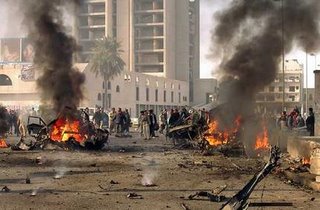 The recent revelations from the National Intelligence Estimate are clear that the bungling of the efforts in Iraq has created a whole new generation of terrorists. Rather than making the U.S. and the rest of the world safer, just the opposite has occurred.
The recent revelations from the National Intelligence Estimate are clear that the bungling of the efforts in Iraq has created a whole new generation of terrorists. Rather than making the U.S. and the rest of the world safer, just the opposite has occurred.The Bush administration and its enablers in the U.S. Congress are responsible for this situation and hopefully will pay a price in the November elections. However, determining responsibility for the mess is easy. Determining a solution to the mess is something else altogether. It cannot be assumed this new generation of terrorists will simply fold their tents and fade into the night if the U.S. does likewise by withdrawing from Iraq. The status quo, of course, is hardly an attractive or sensible alternative either.
If the Democrats are to become the majority party in either house (or, hopefully both) of Congress, then they need to start thinking like a governing party. There are no easy or painless solutions but we need to be thinking and discussing possibilities sooner rather than later. This situation in Iraq is becoming too dangerous for the unchecked Bush administration to be allowed to make matter worse.
This is David Ignatius’ take on that very issue in today’s Washington Post:
The issue raised by the National Intelligence Estimate is much grimmer than
the domestic political game. Iraq has fostered a new generation of terrorists.
The question is what to do about that threat. How can America prevent Iraq from
becoming a safe haven where the newly hatched terrorists will plan Sept.
11-scale attacks that could kill thousands of Americans? How do we restabilize a
Middle East that today is dangerously unbalanced because of America's blunders
in Iraq?
This should be the Democrats' moment, if they can translate the
national anger over Iraq into a coherent strategy for that country. But with a
few notable exceptions, the Democrats are mostly ducking the hard question of
what to do next. They act as if all those America-hating terrorists will
evaporate back into the sands of Anbar province if the United States pulls out
its troops. Alas, that is not the case. That is the problem with Iraq -- it is
not an easy mistake to fix.
****
I wish Democrats (and Republicans, for that matter) were asking this
question: How do we prevent Iraq from becoming a failed state? Many critics of
the war would argue that the worst has already happened -- Iraq has unraveled.
Unfortunately, as bad as things are, they could get considerably worse.
Following a rapid American pullout, Iraq could descend into a full-blown civil
war, with Sunni-Shiite violence spreading throughout the region. In this chaos,
oil supplies could be threatened, sending prices well above $100 a barrel.
Turkey, Iran and Jordan would intervene to protect their interests. James
Fallows titled his collection of prescient essays warning about the Iraq war
"Blind Into Baghdad." We shouldn't compound the error by being "blind out of
Baghdad," too.
The Democrat who has tried hardest to think through these problems is
Sen. Joseph Biden. He argues that the current government of national unity isn't
succeeding in holding Iraq together and that America should instead embrace a
policy of "federalism plus" that will devolve power to the Shiite, Sunni and
Kurdish regions. Iraqis are already voting for sectarian solutions, Biden
argues, and America won't stabilize Iraq unless it aligns its policy with this
reality. I disagree with some of the senator's conclusions, but he's asking the
right question: How do we fix Iraq?
America needs to reckon with the message of the National Intelligence
Estimate. Iraq has compounded Muslim rage and created a dangerous crisis for the United States. The Democrats understandably want to treat Iraq as George Bush's war and wash their hands of it. But the damage of Iraq can be mitigated only if it again becomes the nation's war -- with the whole country invested in finding a way out of the morass that doesn't leave us permanently in greater peril…
No comments:
Post a Comment